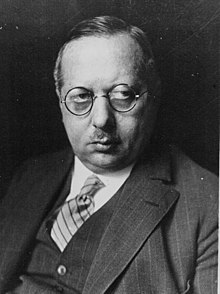Ernst Wagemann
Ernst Wagemann (born February 18, 1884 in Chañarcillo , Chile , † March 20, 1956 in Bad Godesberg ) was a German economist and statistician .
Life
After studying in Göttingen, Berlin and Heidelberg , Wagemann received his doctorate in philosophy in 1907. From 1908 to 1910 he was a lecturer at the Hamburg Colonial Institute . In 1914 he was at the Friedrich-Wilhelms University in Berlin habilitation . In 1919 he was appointed associate professor at the University of Berlin, at the same time he was government and state economics councilor in the Prussian Ministry of Agriculture and lecturer in the Reich Ministry of Economics.
From 1923 to 1933 Wagemann was President of the Reich Statistical Office . In this capacity he was also Reich election supervisor from 1924 to 1933 .
Wagemann is considered to be the founder of empirical economic research in Germany. In 1925 he founded the Institute for Economic Research , which later became the German Institute for Economic Research . In 1932 he presented the Wagemann Plan to combat the economic crisis, in which, without consulting Heinrich Brüning's cabinet, he recommended a moderate increase in the amount of money, combined with a structural reform of the banking system.
In 1933, at Alfred Hugenberg's instigation, Wagemann initially lost all posts, whereupon he immediately joined the NSDAP and, after an audience with Rudolf Hess, became director of the institute again, which he remained until 1945.
In 1948 Wagemann founded the Instituto de Economía in Chile , and from 1949 he held a professorship in Santiago de Chile until he returned to Germany in 1953.
Ernst Wagemann as a population theorist
The demodynamic alternation law is a population law by Ernst Wagemann. It differs fundamentally from Thomas Robert Malthus' law of population . While Malthus assessed any increase in population negatively because of an allegedly only slight increase in population capacity, Wagemann saw an endogenous improvement in population capacity with increasing population densities. This increase takes place through a change in the economic and social system born of necessity to a higher intensity and an improvement in trade through increased cooperation. Since this improvement in population capacity does not occur immediately, but with a time lag, phases of overpopulation and underpopulation (alternation) have repeatedly occurred in the course of socio-cultural evolution with increasing population numbers (demodynamics).
This new approach by Ernst Wagemann shed new light on some questions of political economy: It explains on the one hand the population explosion that has occurred in the last 200 years and on the other hand the side by side of prosperity as well as poverty and hunger. However, today it is no longer possible to detect exact limit values for population density at which overpopulation turns into underpopulation. However, certain socio-structural changes can be shown. A striking example is the ethnic fractionalization of the various states, i.e. the extent to which different population groups face each other in the national territory. With increasing population density in the course of socio-cultural evolution, different groups, which are isolated because of the initially low population density, gradually merge into a more uniform ethnic block.
reception
The law that Ernst Wagemann had developed in the 1940s was forgotten. The Danish agricultural scientist Ester Boserup published similar ideas from the 1960s.
Quote
"One of the most important findings of business cycle theory from the very beginning was the distinction between shorter and longer cycles (...). In practice, it has always been extremely difficult to diagnose the economy from this point of view. It is mine and mine Employees between 1924 and 1945, I think, always really succeeded. When the Reich collapsed, the old economic service went under with him. "
Works
- The German colonists in the Brazilian state of Espirito Santo. Duncker & Humblot, Munich / Leipzig 1915. ( digitized [PDF]). Reprinted 1992, ISBN 3-289-00575-5 .
- The law of alternation of increasing population density: a contribution to the question of habitat. In: Vierteljahreshefte zur Wirtschaftsforschung, Vol. 16, 1941/42, pp. 173–219.
- The number of people and the fate of the people - a doctrine of the optimal dimensions of social structures. Hamburg 1948.
- Tomorrow's world - who will be master of the earth? Düsseldorf: Econ, 1952/53.
literature
- Thomas Pickhardt: Population density and social change: Ernst Wagemann's demodynamic law of alternation - origin, reception, validity, Marburg 2010.
- Hans-Wilhelm Jürgens: On the "new discovery" of the demodynamic law of alternation. In: Zeitschrift für Bevölkerungswissenschaft, 13/2, 1987, pp. 265–266.
Individual evidence
- ↑ The DIW during National Socialism . German Institute for Economic Research. Retrieved June 23, 2013.
- ↑ See Wagner (1948)
- ↑ See Wagemann (1948), p. 92.
- ↑ Cf. Pickhardt (2010), p. 197.
- ↑ Juergens (1987).
- ↑ Wagemann (1952/53), p. 207.
Web links
- Literature by and about Ernst Wagemann in the catalog of the German National Library
- Newspaper article about Ernst Wagemann in the 20th century press kit of the ZBW - Leibniz Information Center for Economics .
- Literature by and about Ernst Wagemann in the catalog of the German Central Library for Economics
- Biographical sketch on the DIW website
- Biographical sketch on the pages of the Johanneum zu Lüneburg
- Wagemann as an economic researcher on the website of the Johanneum zu Lüneburg
| personal data | |
|---|---|
| SURNAME | Wagemann, Ernst |
| BRIEF DESCRIPTION | German statistician |
| DATE OF BIRTH | February 18, 1884 |
| PLACE OF BIRTH | Chañarcillo , Chile |
| DATE OF DEATH | March 20, 1956 |
| Place of death | Bad Godesberg , North Rhine-Westphalia , Federal Republic of Germany |
